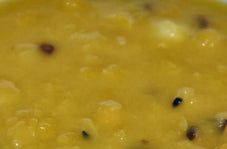Spirulina Powder
 0
0
 2013-12-02
2013-12-02

SPIRULINA
Spirulina (scientific name: Arthrospira platensis), one of the oldest inhabitants of the planet is a tiny single-celled spiral shaped blue-green algae. It is found in mineral-rich lakes, ponds, rivers, often near volcanoes. It smells and tastes similar to seaweed. It is rich in many important nutrients making it an excellent health supplement for preventing many diseases.
NUTRITIONAL VALUE
Spirulina contains various nutrients like proteins (dried spirulina contains around 60%), vitamins (Vitamins A, K, E and B complex), minerals (manganese, zinc, copper, iron, selenium), cartenoids (beta-carotene and yellow xanthophylls) that have antioxidant properties and gamma linolenic acid (an essential fatty acid). It is also rich in chlorophyll. Spirulina has no cellulose in its cell wall, thus enabling its nutrients to be well assimilated by the body.
HEALTH BENEFITS
- Nutrient rich spirulina is considered a super-food, as can be seen from the benefits it has to offer.
- Spirulina helps reduce allergic reactions caused due to atmospheric pollution and improves respiratory function.
- It helps body fight against diabetes.
- Many essential nutrient needs of the body are found in spirulina.
- Contains iron that helps combat anaemia.
- The gama linolic acid in spirulina prevents heart problems and reduce the bad cholesterol.
- The sulfolipids in spirulina are active against AIDS virus.
- Spirulina stimulates the immune system, reduces kidney toxicity.
- The high levels of beta carotene in spirulina (10 times more concentrated than found in carrots) make it good for healthy vision.
- The natural carotenoids found in spirulina are believed to have the most antioxidant and anti-cancer power.
- Spirulina stimulates the growth of good bacteria in the digestive tract, promoting proper bowel function, healthy digestion and relieving constipation.
- Increases stamina and helps build muscle mass.
- Reduces allergic reactions from radiation sickness.
- Its antimicrobial properties help control the growth of bacteria and yeasts.
- The chlorophyll in spirulina functions as a blood cleanser.
- It helps combat spots of aging, eczema, acne and rashes on the skin.
STORAGE
The beneficial effects of spirulina are reduced by high temperatures, moisture and pollution. Store in air-tight containers. Keep as cold as possible, never expose to light except while in use. Can also keep refrigerated in air tight glass jar / bottle. Keep away from any heat source, sun or strong light. Once packaging is opened, it is recommended to use the spirulina within 3 months.
HOW TO CONSUME
Spirulina is available in tablet, flake and powder forms. Add powder to fruit or vegetable juices or to your dishes like soups, salads, pasta or yoghurt. Make fresh lemon juice; add tsp of spirulina, stir and drink. Spirulina capsules / tablets can be had any time of the day. Dosage is 4-6 tablets (500mg each) per day. Tablets must be taken with hot or cold water (avoid taking with tea, coffee, juices, etc.). It is recommended to consume extra half liter of water per day after taking spirulina to help the body absorb it well.
PRECAUTIONS
It is very important to buy a spirulina from a reputable and trusted brand.
There is a possibility of side effects and interactions with certain medications; hence it is advisable to take dietary supplements of spirulina under the supervision of a health care provider.
If pregnant or nursing, talk to the doctor before taking spirulina.
Avoid spirulina in case of any autoimmune disease like rheumatoid arthritis, lupus, and multiple sclerosis since spirulina stimulates the immune system which might worsen the condition. People the metabolic condition of phenylketonuria (PKU) must avoid spirulina since the body cannot metabolize the amino acid phenylalanine which is present in spirulina.
Do not give spirulina to children without consulting a doctor.

 Joybynature.com Team
Joybynature.com Team

